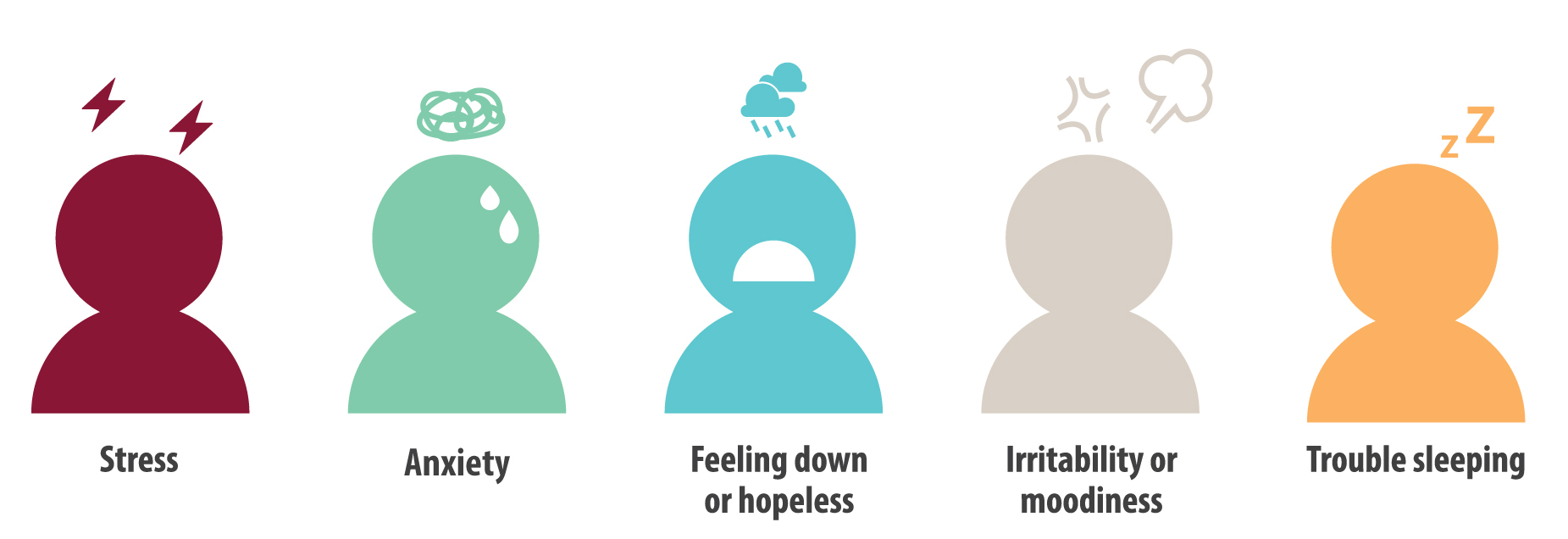Lindsey’s Story: May is National Mental Health Month
by Lindsey Turnbull
I am choosing to share my story in honor of National Mental Health Month. My story is a work in progress, still being told, but I think it bears telling. It’s important to talk openly about mental health. Keep in mind that this story is mine and mine alone- it is not a marker by which readers should compare their own stories. It is not a suggestion guide for how anyone should deal with similar feelings. It is simply my story, as I’m living it.
I’ve always been a worrier. For every situation, I could tell you the absolute worst case scenarios. On the plus side, I usually have a back-up plan. Conversely, I spend a lot of time and energy thinking (and panicking) about things that are highly unlikely.
To-do lists are my favorite thing. I’d like to say my lists show that I’m organized and goal-driven, which is probably true. Sometimes I write to-do lists so long, my heart flutters. Occasionally, I drop everything to write to-do lists because I feel like my heart will jump out of my chest otherwise. I spend a lot of time lying awake at night, agonizing over things not crossed off my lists, wondering which things I should prioritize the next day, wondering if I should get out of bed and write down what might be a great idea, the kind only born when you’re just about to fall asleep. Sometimes I lie awake and review the day. Was that snarky Facebook comment too mean? Did I tip enough at dinner? Would it be weird to e-mail a former professor? My mind wanders further back than that. What about my middle school friend? Why don’t we keep in contact? Maybe I hurt her feelings with a sarcastic comment ten years ago.
Everyone gets exhausted sometimes; for example, finals week can be absolute hell on a sleep schedule. I feel like finals week constantly. I could sleep ten hours and still feel like a zombie. Being exhausted all the time is frustrating. Exhaustion makes it difficult to focus and makes me incredibly irritable. It has not been uncommon for me to blow up at a friend or loved one over a minor or perceived slight and not be able to explain why I was so angry. To me, these instances are embarrassing and leave me feeling as if I have no control over my emotions. This makes me feel even more anxious.

I told my mom all of this, for probably ten thousandth time, and she urged me to see a doctor, for the ten thousand and first time. “Bloodwork,” she said. “You must be low in iron. Or have a slow thyroid. Maybe you need more vitamin D.” I resisted for ages; doctors can be intimidating and I am terrified of needles. (TERRIFIED.) Last week, something in me asked “aren’t you tired of being tired all the time? Don’t you need to like…get stuff done? Aren’t you sick of the ‘screaming into the void’ feeling?”
I shuffled, terrified, into the doctor’s office the next day. He asked me a lot of questions- about my family history, about my feelings, my eating and exercise routines, my sleep patterns, my job, MissHeard- everything. We talked for probably an hour.
“How long have you felt this way?” the doctor questioned.
“Honestly,” I said “it has been at least since I started graduate school- that’s when I started to notice I was becoming nervous in new situations and around new people. Probably before. You know what, I definitely felt this way in undergraduate too, because I took on way too much work, didn’t sleep and drank way too much coffee. So, maybe 5 years? Maybe more?”
“I’ll test your blood just in case, but it sounds like you have classic anxiety and situational depression. You’re anxious all day, you can’t sleep, you’re anxious because you can’t sleep and you’re exhausted because you’re not rested. Sometimes too, you feel like you’re over all of it.”
He wrapped years of intense feelings into three sentences. I got very lucky and happened to stumble into a fantastic doctor’s office and I am excited to say that he and I are working on a variety of solutions to help me learn to deal with my anxiety. (I really lucked out here! If you have a bad encounter with a doctor, try not to give up. Keep looking for someone who can and is willing to work with you!) It may sound strange, but I am excited to know that my sometimes overwhelming feelings have a name. Now that I know that what I have is “anxiety,” I can work to lessen to severity of these feelings. This story is still being written, but I am glad to be taking some positive steps towards feeling my best on a daily basis.
2020’s Update:
The pandemic hit in 2020. There was so much uncertainty and fear. Oddly, I thrived a bit in our lockdown. I worked out virtually (until we determined it was safe to work out outside), I texted friends, I baked, I read, I cleaned, I did arts and crafts, I hung out with my partner. My therapist had recently left her practice, so I knew I needed a new therapist, but I felt fine! There were some odd habits I noticed about myself with my additional free time, but my social anxiety receded as I threw myself into finding resources for friends (most of whom are in the entertainment or service industries).
So many people I loved struggled, but I felt ~*fine*~ save all my weird quirks, especially around time management. I know this is not a universal experience, and may actually be in the extreme minority.
It was around this time I realized my medication wasn’t quite working the same, and I spoke at length with my doctor about changing medications. We had a plan! For anyone reading, it is VERY important to take medication as directed and if you do change or go off of it, to create a plan with your doctor to avoid withdrawal/severe illness.
Somewhere in there, I found a new therapist who practiced a totally different type of a therapy. She helped my correctly identify my weird quirks as ADHD, so that’s in the mix too. Apparently it is somewhat common for ADHD to co-exist with anxiety and depression. I guess ADHD is more of a “brain disorder” than a “mental illness,” but they all seem to exist together.
I’ve realized how important my support system is in the last two years and I’ve really cherished time spent with people, especially face to face. As an introvert, I find that almost shocking, haha! But there’s no better feeling than a big hug from a person you have missed and laughing together. This story is still being written, but it deserved an update 🙂
I wanted to share this story-in-progress for a few reasons:
One, May is National Mental Health Month. Many people find it difficult or embarrassing to talk about mental health. By sharing this story, I hope to chip away at the notion that talking about mental health issues is somehow shameful or embarrassing. While it can be difficult or scary to talk- even to a doctor- about mental health, it is crucial. Mental health is important. It’s not embarrassing to see a doctor if you break your arm or get sick; it shouldn’t be looked down upon for seeing the doctor for a mental health issue.
Two, mental health does not discriminate and people with mental health issues don’t necessarily look or act a certain way. Robin Williams suffered from severe depression. When I told some friends I struggled with anxiety, they told me “I NEVER would’ve guessed you had that.” Or “I always thought you seemed so extroverted!” (While I may be very extroverted in certain situations that is the exception, not the rule!) I think my mom and I were the only people *not* surprised. It doesn’t matter how someone acts sometimes- you never know what they are dealing with on the inside. Anyone can have a mental health issue regardless of their race, income level, race, sexuality, job, religion, age, sex, gender, or any other factor you can think of.
Three, there is power in asking for help. If you feel like something is “off,” don’t be afraid to ask for help. It can feel odd telling a near-stranger (in my case, a doctor at a walk in clinic I had seen when I was sick) super personal things, but it is an important step. Talk to someone you trust- a parent, friend’s parent, clergy member, teacher, coach, whoever, and ask them to point you in the right direction.
Four, I’m writing in part to let readers- young girls and women who may be (or may know someone) dealing with similar things- know that they are not alone. Because of the stigma surrounding mental health, learning you have a mental health issue can feel very isolating. You are not alone. Chances are, a friend or family member may be coping with their own mental health. What I have found, and I hope others will too, is that friends and family are very supportive. If they are not, that is their issue and not yours. You did nothing wrong. I’m not a mental health professional or a doctor or even a parent, but I can say that I’m dealing with similar things- and I’m here for you too.
Note: I first published this article what feels like a million years ago. This story is still a work in progress all those years later.
Lindsey is the founder/Boss Lady of MissHeard Media. When she’s not running MissHeard or coaching Girls on the Run, she is probably listening to really loud heavy metal, watching Pretty Little Liars or reading a book. Tweet with Lindsey @missheardmedia.
Related Reading:
Mental Health 101: An Overview by Lindsey Turnbull
Mental Health 201: Anxiety and Depression by Lindsey Turnbull
Mental Health 202: Eating Disorders by Lindsey Turnbull
Mental Health 301: Obsessive Compulsive Disorder by Lindsey Turnbull
Mental Health 302: PTSD by Lindsey Turnbull
Leaders, Your Mental Health Matters Too by Julia Schemmer
The Portrayal of Mental Illness in the Media by Tracy Yu
Additional Resources:
Take a screening for commonly diagnosed mental illnesses.
www.nami.org and The NAMI Fact Sheet Library
The National Institute of Health
How to Support a Friend (and what to avoid)
Black Emotional Mental Health Collective
The Trevor Project for Young LGBTQ Lives
National Asian American Pacific Islander Mental Health Association
National Alliance for Hispanic Health
Indian Health Service
You can also google “Teen Mental Health + your city” to find therapists who work with teens.

3 thoughts on “Lindsey’s Story: May is National Mental Health Month by Lindsey Turnbull”